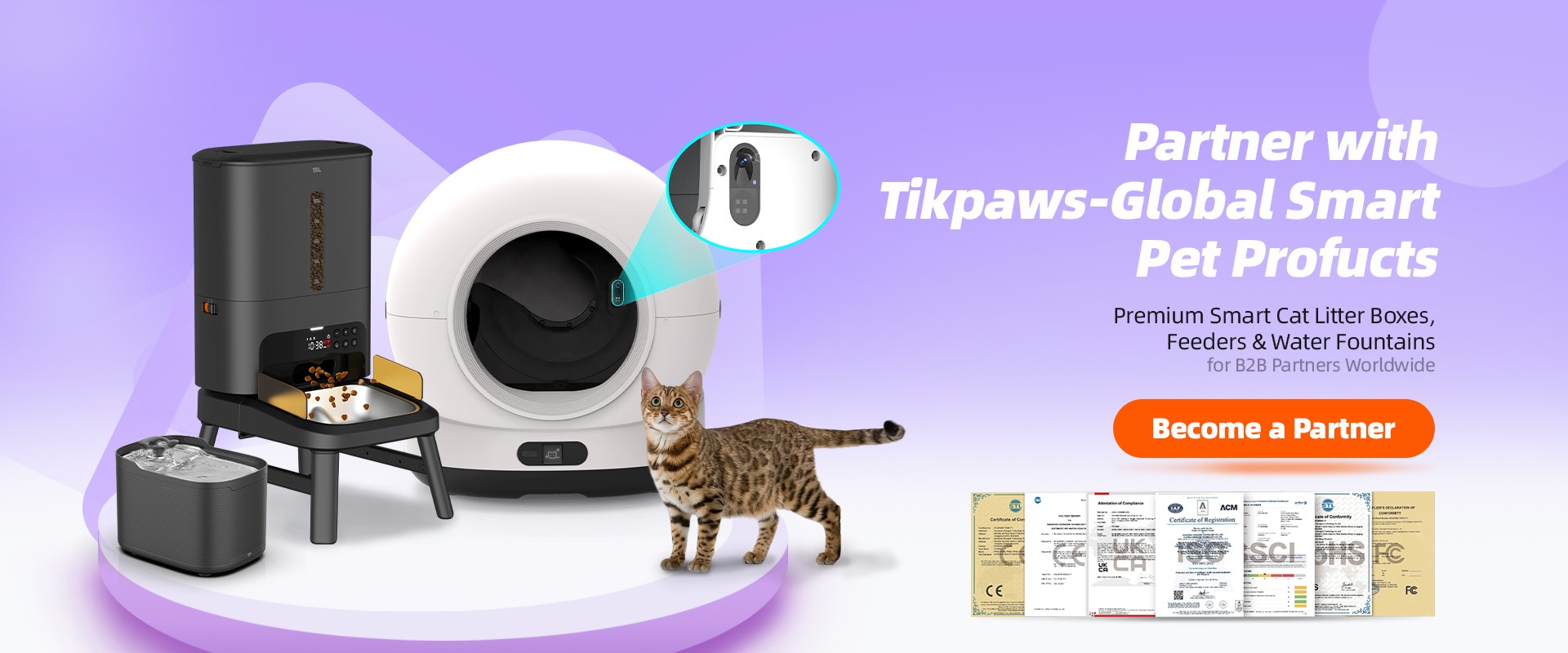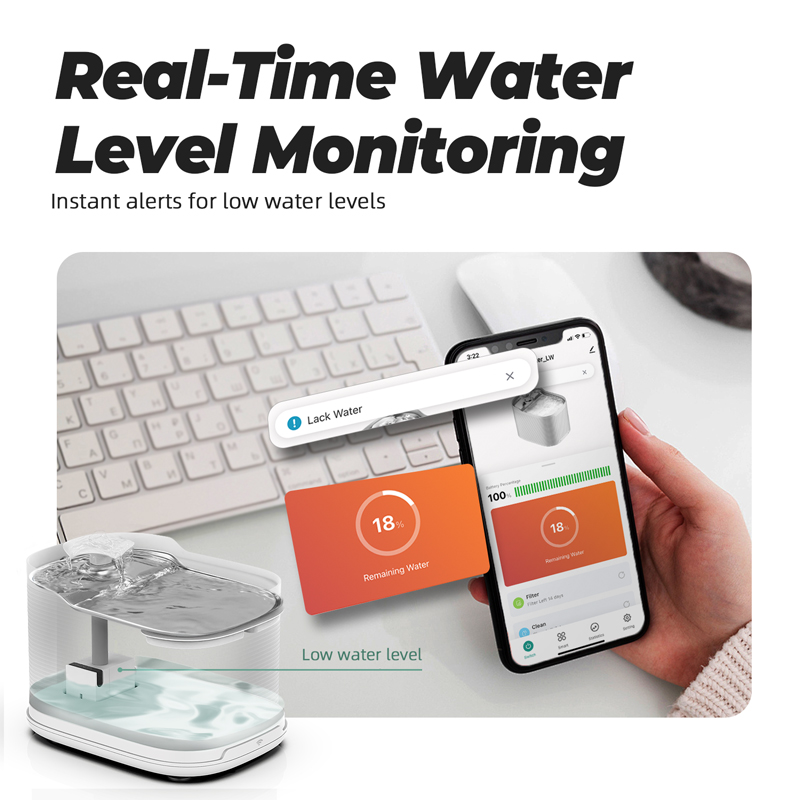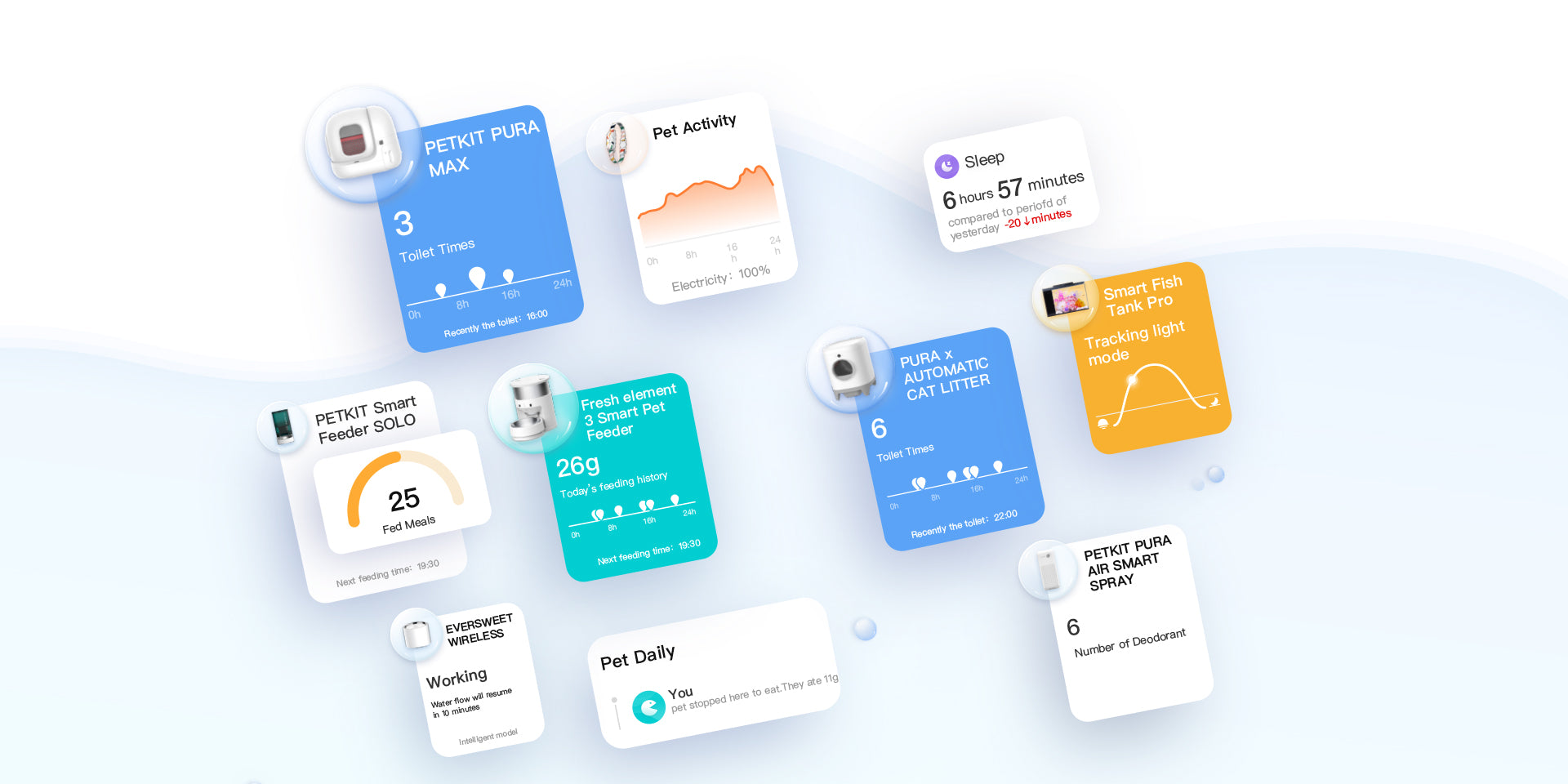Using Smart Pet Devices to Improve Pet Health
Date: 2025-10-16 Categories: Trends Hits: 846
Using Smart Pet Devices to Improve Pet Health | 2025 Expert Guide
How smart pet tech enhances hydration, nutrition, activity, and early health detection for dogs and cats

Smart pet devices ecosystem: feeders, hydration monitors, activity trackers working together to improve pet health
1. Introduction to Smart Pet Health Devices
Today's smart pet devices go far beyond convenience—they actively contribute to your pet's overall health and wellbeing. From intelligent water fountains that monitor hydration to automated feeders that manage nutrition, and GPS collars that track daily activity, modern pet health tech allows owners to detect health issues early and make data-driven care decisions.
As more pet owners prioritize preventive healthcare, smart pet products have become essential tools. These devices provide real-time insights into your pet's daily habits, helping you identify changes that may indicate underlying health problems.
According to Tuya Smart's Pet Tech Solutions, connected pet products have grown rapidly as more families integrate smart care systems into their daily routines. This article explores how these smart pet devices enhance your pet's health through hydration monitoring, controlled feeding, activity tracking, and wellness analytics.

Smart pet activity tracker collar paired with a connected feeder for comprehensive pet health monitoring
2. Hydration Monitoring with Smart Pet Fountains
Hydration is one of the most important yet often overlooked aspects of pet health. Many cats naturally drink insufficient water, increasing their risk of urinary tract and kidney problems. Smart pet fountains like the PetSafe Smart Feed and Tuya-powered devices provide real-time water level and drinking behavior tracking, alerting owners if intake drops suddenly.
Key Benefits of Smart Hydration Monitors
Track daily water intake to ensure optimal hydration
Receive alerts for abnormal drinking patterns (too little or too much)
Circulate water to encourage more frequent drinking
Monitor water freshness and filter replacement needs
The AVMA's hydration guide confirms that consistent access to fresh, circulating water can significantly improve long-term kidney health in pets. Pairing a smart pet fountain with hydration reminders in your mobile app helps ensure your pet stays properly hydrated even when you're away.

Smart pet water fountain monitoring a cat's hydration levels and drinking patterns
3. Smart Pet Feeders for Nutrition Management
Overfeeding is a common cause of obesity and digestive issues in pets. Smart pet feeders allow you to schedule meals, control portions, and check feeding logs remotely—critical for maintaining a healthy weight and balanced diet. According to Tuya's industry analysis of smart pet feeding systems, automatic feeders with app control help maintain balanced nutrition and prevent overeating.
How Smart Feeders Improve Pet Health
Precise portion control to prevent obesity and weight-related issues
Regular feeding schedules to support digestive health
Remote feeding capability for busy pet owners
Feeding log tracking to identify appetite changes early
Smart pet feeders also provide data trends over time—if your cat starts leaving food behind or your dog eats less than usual, you can identify appetite loss early, which may indicate digestive or emotional issues. This early detection can lead to faster veterinary care and better treatment outcomes.

Smart pet feeder with portion control and remote access for optimal pet nutrition management
4. Pet Activity Trackers & Health Monitoring
Physical activity is crucial for long-term pet health. Pet activity trackers and smart collars record movement, rest time, calories burned, and even sleep quality. Used correctly, these smart pet devices highlight behavioral and health changes that might otherwise go unnoticed.
Key Features of Pet Activity Trackers
Daily activity goal setting based on breed, age, and weight
Sleep pattern monitoring to detect restlessness or insomnia
Calorie burn tracking for weight management
GPS tracking for outdoor pets (preventing loss and monitoring exercise)
For instance, the Litter-Robot 4's SmartScale system automatically tracks your cat's weight changes while monitoring litter box visits. This passive monitoring can catch early signs of illness—like reduced movement or unexpected weight loss—before symptoms become visible. Combined with a pet activity tracker, you get a comprehensive view of your pet's physical health.

Smart pet activity tracker collar syncing health and activity data to a mobile app for pet owners
5. Pet Health Data Analysis & Alerts
Modern smart pet device apps combine hydration, feeding, and activity data to build a complete profile of your pet's health. When trends deviate from the norm, owners receive automated alerts—a key advantage of pet health tech. Subtle changes—less drinking, skipped meals, shorter naps, or reduced activity—often appear weeks before an illness becomes critical.
How Health Data Analysis Benefits Pets
Early detection of health issues (kidney problems, diabetes, arthritis)
Data sharing with veterinarians for more accurate diagnoses
Long-term health trend tracking for proactive care
Customized care recommendations based on your pet's unique needs
By combining insights from these smart pet systems, pet parents gain a data-driven understanding of health that traditional observation cannot match. For example, a sudden increase in water intake paired with weight loss could signal diabetes—something an app might flag before you notice physical symptoms.

Smart pet health app dashboard displaying hydration levels, activity data, and feeding logs
6. Integrating Smart Pet Devices at Home
Building a cohesive smart pet ecosystem at home requires careful planning to ensure compatibility and maximum health benefits. Here are expert tips for successful integration:
Start with one core device, such as a feeder or fountain, before expanding to trackers or litter boxes. This allows you to get comfortable with the technology and see real benefits early.
Choose compatible systems—look for smart pet devices that work with your existing smart home platform (Alexa, Google Home, Apple HomeKit) for seamless control.
Keep sensors clean to maintain data accuracy—dirt and debris can affect readings from weight sensors and activity trackers.
Use devices for trends, not diagnosis—always consult your veterinarian if you notice concerning changes in your pet's data.
Ensure stable Wi-Fi coverage, especially in large homes or outdoor areas where trackers might be used.
For those considering a smart litter box, models like the Whisker Litter-Robot 4 or the Popur Automatic Self-Cleaning Cat Litter Box include smart integrations suitable for modern multi-device pet health tech setups.

Integrated smart pet device setup in a modern home with connected feeder, fountain, and litter box
7. Conclusion: Smart Tech for Pet Wellness
Smart pet devices transform daily care into preventive health management. Connected feeders, fountains, trackers, and litter boxes enable tracking of hydration, weight, activity, and litter habits—all accessible from your smartphone. These tools empower pet owners to be more proactive about their pet's health and catch potential issues earlier.
As pet health tech continues to evolve, we can expect even more advanced features like AI-powered health predictions and integration with veterinary telemedicine platforms. The key benefit remains the same: bridging the gap between daily observations and professional healthcare.
When combined with veterinary guidance, proper device maintenance, and regular interaction, these smart pet products help ensure your furry companion enjoys a healthier, happier life. Smart technology isn't just convenient; it's becoming a cornerstone of modern pet healthcare that no pet owner should overlook.
